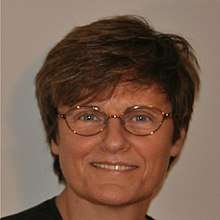Katalin Kariko
Katalin Karikó (born 17 January 1955 in Szolnok, Hungary) is a Hungarian biochemist who specializes in RNA-mediated mechanisms. Her research has been the development of vitro-transcribed mRNA for protein therapies. She currently serves as the Senior Vice President at BioNTech RNA Pharmaceuticals.
Karikó's work includes scientific research of RNA-mediated immune activation resulting in the co-discovery of the nucleoside modifications that suppress the immunogenicity of RNA. This is seen as expanding the therapeutic potential of mRNA. She holds patents granted in the United States for application of non-immunogenic, nucleoside-modified RNA. She co-founded and served as CEO of RNARx from 2006-2013.[1]. Katalin Karikó is the mother of 2-time Olympic Gold Medalist Susan Francia.

Early life and education
Kariko grew up in the Hungarian town of Kisujszallas where she attended Móricz Zsigmond Református Gimnázium. After earning her Ph.D., Karikó continued her research and postdoctoral studies at the Institute of Biochemistry, Biological Research Centre, the Temple University Department of Biochemistry, and the Uniformed Services University of the Health Science. While serving as postdoctoral fellow at Temple University in Philadelphia, Karikó participated in a clinical trial in which patients with AIDS, hematological diseases and chronic fatigue were treated with dsRNA. At the time, this was considered groundbreaking research as the molecular mechanism of interferon induction by dsRNA was not known, but the antineoplastic effects of interferon were well documented.[2]
Career
In 1990, while a Professor at the University of Pennsylvania, Karikó submitted her first grant application in which she proposed to establish mRNA-based gene therapy,[3] Ever since, mRNA-based therapy has been Karikó’s primary research interest. Karikó served for nearly 25 years as a Professor at the University of Pennsylvania Medical School.
In 2012, Karikó and Drew Weissman, an immunologist at the University of Pennsylvania, received a patent for the use of several modified nucleosides to reduce the antiviral immune response to mRNA and they founded a small company. Soon after, UPenn sold the intellectual property license to Gary Dahl, the head of a lab supply company that eventually became Cellscript. Weeks later, Flagship Pioneering, the venture capital company who was and still is backing Moderna, contacted her in hopes of licensing the patent. All Karikó said was “we don’t have it.” In early 2013, Karikó heard of Moderna’s $240 million deal with AstraZeneca to develop a VEGF mRNA. Karikó realized she would not get a chance to apply her experience with mRNA at UPenn and took her role as Senior Vice President at BioNTech RNA Pharmaceuticals.[3]
Her research and specializations include Messenger RNA-based gene therapy, RNA-induced immune reactions, molecular bases of ischemic tolerance and treatment of brain ischemia.
Scientific contributions
The work and research of Karikó has contributed to BioNTech’s effort to create immune cells that produce vaccine antigens — Karikó’s research revealed the ability to leverage the antiviral response to mRNA to give their cancer vaccines an extra boost in defense against tumors.[3]
Patents
US8278036B2[4] & US8748089B2[5] — This invention provides RNA, oligoribonucleotide, and polyribonucleotide molecules comprising pseudouridine or a modified nucleoside, gene therapy vectors comprising same, methods of synthesizing same, and methods for gene replacement, gene therapy, gene transcription silencing, and the delivery of therapeutic proteins to tissue in vivo, comprising the molecules. The present invention also provides methods of reducing the immunogenicity of RNA, oligoribonucleotide, and polyribonucleotide molecules.[4][5]
Select publications
- Anderson B, Muramatsu H, Nallagatla SR, Bevilacqua P, Sansing L, Weissman D, Karikó K: Incorporation of pseudouridine into mRNA enhances translation by diminishing PKR activation. Nucleic Acids Res 38: 5884-92, 2010.
- Karikó, K., Muramatsu, H., Welsh, FA., Ludwig, J., Kato, H., Akira, S., Weissman, D.: Incorporation of pseudouridine into mRNA yields superior nonimmunogenic vector with increased translational capacity and biological stability. Molecular Therapy 16: 1833-1840, 2008.
- Karikó K, Buckstein M, Ni H, Weissman D.: Suppression of RNA recognition by Toll-like receptors: the impact of nucleoside modification and the evolutionary origin of RNA. Immunity 23(2): 165-75, 2005. Suppression of RNA recognition by Toll-like receptors: the impact of nucleoside modification and the evolutionary origin of RNA
- Karikó K, Weissman D, Welsh FA: Inhibition of toll-like receptor and cytokine signaling--a unifying theme in ischemic tolerance. J Cereb Blood Flow Metab 24(11): 1288-304, 2004.
- Karikó K, Ni H, Capodici J, Lamphier M, Weissman D.: mRNA is an endogenous ligand for Toll-like receptor 3. J Biol Chem 279(13): 12542-12550, 2004.
References
- "Katalin Kariko - Associate Professor of Neurosurgery in Philadelphia, Pennsylvania, United States Of America | eMedEvents". www.emedevents.com. Retrieved 2020-04-27.
- Elsevier. "Transforming RNA research into future treatments: Q&A with 2 biotech leaders". Elsevier Connect. Retrieved 2020-04-27.
- "Keener 2018 Nat Med mRNA news.pdf". Google Docs. Retrieved 2020-04-27.
- , "RNA containing modified nucleosides and methods of use thereof", issued 2006-08-21
- , "RNA containing modified nucleosides and methods of use thereof", issued 2013-03-15